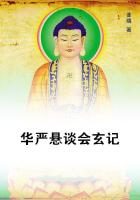"If you had, and nothing else, you wouldn't have me"--Chad started as the little witch paused a second, drawling--"leaving my friends and this jolly dance to go out into a freezing yard and talk to an aged Colonial who doesn't appreciate his modern blessings. The next thing you'll be wanting, Isuppose--will be--"
"You, Margaret; you--YOU!"
It had come at last and Margaret hardly knew the choked voice that interrupted her. She had turned her back to him to sit down. She paused a moment, standing. Her eyes closed; a slight tremor ran through her, and she sank with her face in her hands. Chad stood silent, trembling. Voices murmured about them, but like the music in the house, they seemed strangely far away. The stirring of the wind made the sudden damp on his forehead icy-cold. Margaret's hands slowly left her face, which had changed as by a miracle. Every trace of coquetry was gone. It was the face of a woman who knew her own heart, and had the sweet frankness to speak it, that was lifted now to Chad.
"I'm so glad you are what you are, Chad; but had you been otherwise--that would have made no difference to me. You believe that, don't you, Chad? They might not have let me marry you, but I should have cared, just the same. They may not now, but that, too, will make no difference." She turned her eyes from his for an instant, as though she were looking far backward. "Ever since that day," she said, slowly, "when I heard you say, 'Tell the little gurl I didn't mean nothin' callin' her a little gal'"--there was a low, delicious gurgle in the throat as she tried to imitate his odd speech, and then her eyes suddenly filled with tears, but she brushed them away, smiling brightly. "Ever since then, Chad--" she stopped--a shadow fell across the door of the little summer house.
"Here I am, Mr. Hunt," she said, lightly; "is this your dance?" She rose and was gone. "Thank you, Mr. Buford," she called back, sweetly.
For a moment Chad stood where he was, quite dazed--so quickly, so unexpectedly had the crisis come. The blood had rushed to his face and flooded him with triumphant happiness. A terrible doubt chilled him as quickly. Had he heard aright?--could he have misunderstood her? Had the dream of years really come true? What was it she had said? He stumbled around in the half darkness, wondering. Was this another phase of her unceasing coquetry? How quickly her tone had changed when Richard Hunt's shadow came. At that moment, he neither could nor would have changed a hair had some genie dropped them both in the midst of the crowded ball-room. He turned swiftly toward the dancers. He must see, know--now!
The dance was a quadrille and the figure was "Grand right and left." Margaret had met Richard Hunt opposite, half-way, when Chad reached the door and was curtseying to him with a radiant smile. Again the boy's doubts beat him fiercely; and then Margaret turned her head, as though she knew he must be standing there. Her face grew so suddenly serious and her eyes softened with such swift tenderness when they met his, that a wave of guilty shame swept through him. And when she came around to him and passed, she leaned from the circle toward him, merry and mock-reproachful:
"You mustn't look at me like that," she whispered, and Hunt, close at hand, saw, guessed and smiled. Chad turned quickly away again.
That happy dawn--going home! The Major drowsed and fell asleep. The first coming light, the first cool breath that was stealing over the awakening fields, the first spring leaves with their weight of dew, were not more fresh and pure than the love that was in the boy's heart. He held his right hand in his left, as though he were imprisoning there the memory of the last little clasp that she had given it. He looked at the Major, and he wondered how anybody on earth, at that hour, could be asleep. He thought of the wasted days of the past few months; the silly, foolish life he had led, and thanked God that, in the memory of them, there was not one sting of shame. How he would work for her now! Little guessing how proud she already was, he swore to himself how proud she should be of him some day. He wondered where she was, and what she was doing. She could not be asleep, and he must have cried aloud could he have known--could he have heard her on her knees at her bedside, whispering his name for the first time in her prayers; could he have seen her, a little later, at her open window, looking across the fields, as though her eyes must reach him through the morning dusk.
That happy dawn--for both, that happy dawn!
It was well that neither, at that hour, could see beyond the rim of his own little world. In a far Southern city another ball, that night, had been going on. Down there the air was charged with the prescience of dark trouble, but, while the music moaned to many a heart like a god in pain, there was no brooding--only a deeper flush to the cheek, a brighter sparkle to the eye, a keener wit to the tongue; to the dance, a merrier swing. And at that very hour of dawn, ladies, slippered, bare of head, and in evening gowns, were fluttering like white moths along the streets of old Charleston, and down to the Battery, where Fort Sumter lay, gray and quiet in the morning mist--to await with jest and laughter the hissing shriek of one shell that lighted the fires of a four years' hell in a happy land of God-fearing peace and God-given plenty, and the hissing shriek of another that Anderson, Kentuckian, hurled back, in heroic defence of the flag struck for the first time by other than an alien hand.













